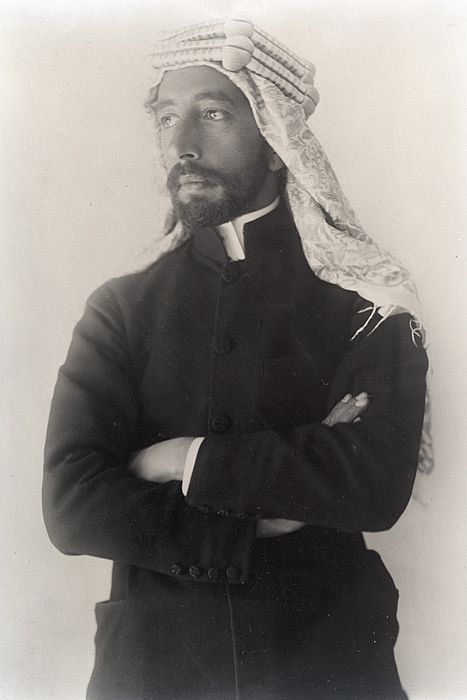Feature Profile - The Arab Question - Lawrence and Feisal
Lawrence, Feisal and Arab Independence
The issue of Arab independence promised by the British in 1915 was an expectation that T.E. Lawrence and Prince Feisal took with them when they attended the Paris Peace conference in 1919. Lawrence and Prince Feisal had beat the Ottoman Empire alongside the British and sort to give sections of this to the Hashemite Kingdoms. However, the big powers such as Britain and France refused these requests despite previously being supportive of Arab independence, as they challenged their own territorial and economic aims in the Middle East set out in the secret 1916 Sykes-Picot Agreement.

In this agreement Syria, the land Prince Feisal sort to make independent and Lebanon would go to France, while Britain would rule Palestine, Jordan and Iraq and the Arabs, despite being promised an independent state like Armenia would gain nothing for their sacrifice and allegiance to the Allies. The big powers justified their logic by suggesting that the Arabs contribution had been exaggerated by Lawrence and others, with 3,500 Arab soldiers being dwarfed by 1, 400,000 soldiers committed to fighting the Ottoman Empire by the British.
Despite the level of opposition to Arab Independence, Lawrence encouraged Prince Feisal to attend the Paris Peace Conference in January 1919 and acted as his translator, political advisor and speech writer. When they arrived at the conference the French attempted to hinder Prince Feisal journey, taking him on a detour away from Paris and claiming upon his arrival at the conference that his name was not on the list of official delegates, with only British complaints allowing him to join the conference. However, he was still relegated to the position of a representative of Hejaz. (1)
Though the French attempted to block Prince Feisal and Arab Independence more directly, the British were divided on the issue like America. Lloyd George felt the conditions in the Middle East had changed after 1916, with the Sykes-Picot agreement was outdated and the Arabs calls for independence somewhat viable. However, Syria was not part of Britain’s territorial claims and ultimately their willingness to support Arabian Independence was solely centered around their own self-interests, as they sought to limit the influence that the French would have in the Middle East. (2)
In early January 1919 Prince Feisal much like Syngman Rhee in the Korean Independence Movement appealed to America by saying, "the Arabs of this most ancient race…desire to become the youngest independent state in Asia, and they appeal to America as the most powerful protector of the freedom of man."(3) President Wilson similarly to Korea and Armenia valued the membership and allegiance of big powers like France and Britain in the League of Nations, thus, sacrificing his ideals of self-determination and freedom for the self-interest of bigger powers. Furthermore, America was not going to take responsibility for the mandate of Syria or give that territory to Britain in order to appease the Arabs, as the senate’s policy of isolationism making any attempt to aid an Arab independence struggle that were similar to those in Korea and Armenia impossible.(4)
Therefore, like Armenia and Korea any hopes of Arab independence were rejected and undermined by the self-interests of states. Ultimately these big powers prevented smaller nations from achieving self-determination and justice, with the new ideals of international cooperation set out in Woodrow Wilsons 14 points being sacrificed for the traditional ways of seizing and carving up territory and handing out spoils of war to the big victorious powers. However, there was some justice for Lawrence, Prince Feisal and the Arab people, with the Cairo Conference in March 1921 providing former Turkish territories controlled by the British to the Hashemite family who represented and fought for Arab Independence in 1919. Prince Feisal was given control over the land that would eventually be known as Iraq and became King in 1922.

